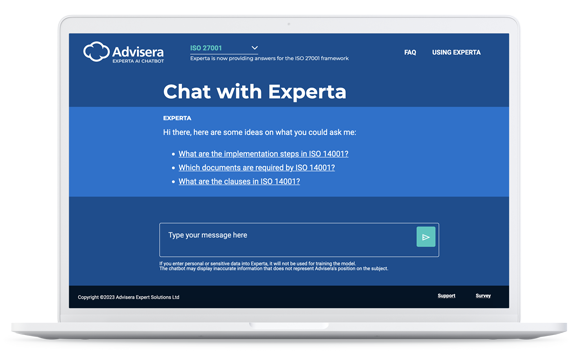Embarking on the journey of implementing ISO 9001 can raise numerous questions related to understanding the standard’s requirements, organizing the project effectively, determining the details of each implementation step, preparing necessary documentation, deciding who should spearhead the implementation process, and determining the types of evidence required for certification.
Fortunately, these queries can be comprehensively addressed using AI tools. In the following sections, I will present various examples to illustrate this.
- What are the requirements of the standard?
- How should the project be organized?
- How should each step be implemented?
- How should documentation be handled?
- What kind of evidence is needed for certification?
In this discussion, I will utilize Experta, an AI-powered, chatbot-style knowledge base tailored for ISO 9001. Unlike general AI chatbots like ChatGPT, which may not consistently deliver the precision required for such specific inquiries, a specialized AI tool like Experta is better suited to provide accurate and relevant information for ISO 9001 implementation.
For more on the advanced usage of Al tools for consultants, see this article: How can Al help ISO 9001 consultants?
What are the requirements of the standard?
Initially, you might want to understand the basics of the standard. To achieve this, consider asking questions like these: (click the question or the image to show the full answer):
“What are the main benefits of ISO 9001?”
“What is a Quality Management System?”
“What are quality objectives, and why are they important?”
How should the project be organized?
Once you’ve acquired foundational knowledge, it’s time to organize your ISO 9001 implementation project. Consider exploring the following aspects:
“What are the steps in ISO 9001 implementation?”
“How long does it take to implement ISO 9001?”
“How do you select the project manager for ISO 9001?”
“Should we use an ISO 9001 consultant?”
How should each step be implemented?
After organizing your project, the next phase is the step-by-step implementation of the standard. Here are some key questions to consider:
“What are the steps to define the QMS scope?”
“Who should be in charge of defining the QMS scope?”
“How to identify, evaluate and control risks according to ISO 9001 requirements?”
“How do I determine the necessary infrastructure for my organization?”
“How to implement design and development?”
How should documentation be handled?
As you implement your QMS, it becomes essential to consider documentation management. Here’s a set of questions to keep in mind:
“What are mandatory documents for ISO 9001?”
“How to document clause 4.2 Understanding the needs and expectations of interested parties?”
“How to document ISO 9001 clause 8.3 Design and development of products and services?”
“What is the structure of a quality policy?”
What kind of evidence is needed for certification?
When aiming for certification, thinking about the required evidence is natural. If your company is pursuing this goal, you might find yourself pondering questions like:
“What kind of records are needed according to ISO 9001?”
“Are training records required?”
“What will the certification auditor look for regarding clause 7.4 Communication?”
Is an Al chatbot enough for implementation?
I’m not suggesting that Experta or other AI-driven chatbots could fully take over the role of traditional resources in implementing ISO 9001 – you’ll still require document templates, among other things.
Nevertheless, AI-driven chatbots can serve as an excellent supplementary resource. Such chatbots can handle tasks that might not be immediately clear from standard templates or software tools.
It’s important to note that the questions highlighted in this article merely illustrate what one might inquire from Experta – I encourage personal exploration and discovery. There’s much to be gained!
Experta AI-powered chatbot is free to use — click here to start using it. Experta is trained on a proprietary knowledge base built by Advisera’s ISO 9001 experts.

 Carlos Pereira da Cruz
Carlos Pereira da Cruz



















